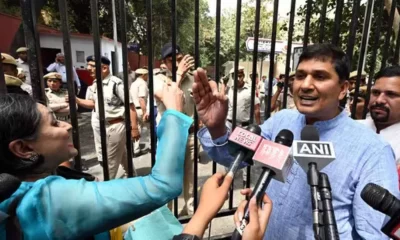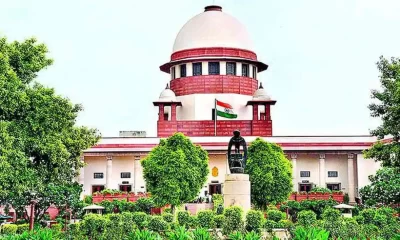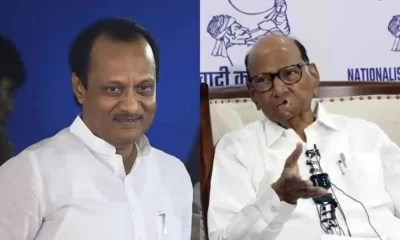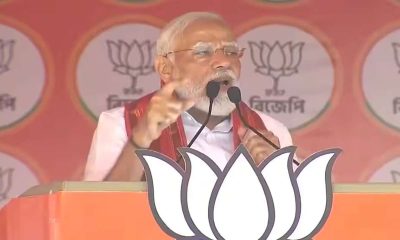Latest Art & Culture
Women Reject the Menstruation Benefit Bill

Tabled as a private members bill in Parliament this winter session, it attracts fierce criticism from the female workforce of the country.
~By Usha Rani Das
The Menstruation Benefit Bill was prepared with good intentions — it gives women workers the right to take certain days off from work during their periods when pain and cramps are often unbearable. However, it has inadvertently raised another pertinent gender issue: will employers be reluctant to hire or promote women knowing they will be unavailable in the workplace for those days every month?
The Bill has sparked a lively debate among women and in the corporate world in general. “How can we talk about our periods to our boss? I just say ‘I am not well’ when I have unbearable cramps and take leave,” said Asmita, who works in one of the top consultancy firms of the country.
There are overwhelming taboos around periods that make women leave their jobs and girls quit schools. It all starts with the shopkeeper wrapping the sanitary napkins in black plastic or a newspaper and ends with women being treated as a weaker section of the society. Hence when the Menstruation Benefit Bill was tabled in the Parliament, it has stoked a much-needed debate in the country.
Tabled as a private members bill in the winter session of the Parliament, 2018, it seeks to provide all female employees in public and private sector two-day mandatory leave for period every month. Ninong Ering, Lok Sabha MP from Arunachal Pradesh, who drafted the Bill, told India Legal: “The thing is that when people speak of gender equality—’Same work Same pay’, they should also consider all sort of difficulties that women face. I have seen my wife and daughters in pain during periods. For some women it is quite normal but for some it is unbearable. They even have low pressure problems due to this. They can’t work during this time. So, we should grant leave. Of course, some bosses don’t understand. They don’t want to bring it to black and white. But I say let us bring it in black and white. That’s why we have taken it up in the Parliament. We are just making a suggestion. I want a discussion to start around this.”
Though the move is well-intentioned, it has met with wide criticism from the women workforce. Experts say the Bill could actually result in isolation or exclusion of women. Supreme Court lawyer Karuna Nundy told India Legal: “There are all sorts of equalities that are very important to implement in all workplaces but they should be done in a well-tailored way. All women don’t have menstruation pain. There are many women who don’t have such pain and don’t need such leaves at all. There should be a conversation around how to tailor a sensitive law, that includes women workers who suffer from diseases like endometriosis, gynecologists, and gender educated policy makers… I do believe that legislation that guarantees non-discrimination at workplaces is vital. Otherwise, in less conscientious companies, and factories and other establishments this will become another excuse for to discriminate against women workers.”
Fear of exclusion
Though the debate of “period leave” dates back to World War II, it made headlines again in India in 2017 when a digital media company Culture Machine started a policy of “paid menstrual leave”—day off on the first day of period. It had also started an online petition asking the Ministry of Woman and Child Development and the Ministry of Human Resources Development to make it mandatory for all companies to grant menstrual leave. But it was opposed by many. Dr Ranjana Kumari, director of Centre for Social Research, Delhi, told India Legal: “He has raised it with a good intention. But there is need for a much bigger debate for this leave. Menstruation should not be treated as a disability. It should not be treated as illness. Making it mandatory would lead to a lot of time loss for companies and the governments. As a result, women will be on the weaker side of job-seeking opportunities. First of all not every woman goes though the similar kind of pain. Secondly this is something that people would have to take it in society as something which is very normal and which happens to every woman. Mandatory leaves are not at all liable and feasible. It can be made optional but that has to come after serious discussions.”
Hariom Tyagi, founder and CEO of Wet&Dry (W&D), feels that whether an employee would take that leave should be left at the discretion of the employees. He told India Legal: “I think it should not be made mandatory. It is a personal choice. There are women who don’t need it. It should be left to every company and employee whether or not they would give it. It can backfire. It can trigger a debate about male and female discrimination. We have more than 25 female employees and there are about 8-10 employees who have never availed this leave.”
Companies might use the additional days off to justify lower pay or increasing hiring bias against women. It could leave them out of decision making roles and can even affect their promotions. A female HR, on condition of anonymity, told India Legal: “Mandatory period leave would lead to hiring bias in the companies. In most of the companies the number of female employees is much less than that of male employees. The companies will somehow manage to compensate the period leaves which might lead to lesser pay-scale and lesser promotion. Women often feel that they are not being hired as they are ‘women’. It will only affect their self-confidence.”
A 2002 study of Nike and Adidas workers in factories in Indonesia, We Are Not Machines by Timothy Connor, found that in the Nikomas Gemilang factory “workers who want to claim legally-mandated menstrual leave must still go through the humiliating process of proving they are menstruating by pulling down their pants in front of female factory doctors”. In 1947 Japan passed a law that allows any woman with painful periods, or whose job might exacerbate period pain, to take leaves. However, a 1986 study of this policy found that the number of women availing it declined from 20 percent in 1960 to 13 percent in 1981. Reports stated societal pressures to be one of the main reasons.
In 2001 South Korea granted women menstrual leave though the policy has faced lot of fire from men who see it as a form of reverse discrimination. In Indonesia too, women are entitled to two-day offs a month, but the policy is poorly enforced as it states that women are entitled to certain amount of unpaid leave when they have their period. Even during World War II, female air service pilots were often barred from flying if they had cramps.
Feminist anthropologist Emily Martin in her study, The Woman in the Body: A Cultural Analysis of Reproduction, 1987, talks about how menstruation affects women’s capacity to work. She pointed out that studies “that showed the debilitating effects of menstruation” coincided with post-war periods in history when “women were displaced from many of the paid jobs they had taken on” when men were deployed at war. Commenting on the explosion of studies in the 1980s on premenstrual syndrome, Martin saw a “conjunction between periods of our recent history when women’s participation in the labour force was seen as a threat, and, simultaneously, menstruation was seen as a liability”.
In India it might have much bigger effects where women consist of only 25.8 percent of the workforce. Santosh Kumar Gangwar, Minister of State for Labour and Employment, said in a reply to Lok Sabha questions in the winter session of Parliament that the female workforce in India has registered a decline in the financial year 2015-16; while male workers in FY16 stood at 73.3 percent females stood at 25.8 percent.This was far less than the preceding year where female constituted 29.6 percent of the workforce.
“The estimated female Worker Population Ratio aged 15 years and above on usual status basis was 25.0% during 2012-13, 29.6% during 2013-14 and 25.8% during 2015-16 and the GDP growth rate has been 5.5%, 6.4% and 8.0% for the years 2012-13, 2013-14 and 2015-16,” the report said. In another reply to Lok Sabha questions on “job seekers” in India, Gangwar revealed that the number of females seeking jobs was half of the male population doing the same. “As on November 30, 2017, there are 2.54 crore male and 1.33 crore female jobseekers who are registered in NCS Portal,” Gangwar said.
India also slipped 21 spaces from its 87th position in 2016 to 108in 2017 in the Global Gender Gap index released by World Economic Forum in November 2017. Oxfam data released in April 2017 also labeled India’s wage gap as the worst in the world. Women form 60% of the lowest paid wage labour, but only 15% of the highest wage-earners. It means that in India women are not only poorly represented in the top bracket of wage-earners but also experience wide gender pay gap at the bottom, the report said. The Global Wage Report 2016-17 showed that the wage gap in India’s manufacturing sector touched 30 percent which was labeled the “lowest paid” in India.
Setting an example
The issue of period policy was taken up by various media and civil society organisations when several surveys showed how women had to quit their jobs due to period woes. A 2012 study titled Dysmenorrhea by Pallavi Latthe, Rita Champaneria and Khalid Khan states: “Dysmenorrhea (painful periods) is very common, and it may be severe enough to interfere with daily activities in up to 20 percent of women. According to a 2016 research by John Guillebaud, professor of reproductive health at the University College London, period pain can be as “bad as having a heart attack”.
India has tried to incorporate such policies as early as 1912. A girls’ school in Kerala had granted its students menstrual leave since 1912. Bihar has had a policy since 1992. A January 2, 1992 government order stated that: “In keeping with the demand raised by various employee associations and the agreement arrived at with them, all women who are regular government employees will be given two consecutive days of special casual leave every month.”
A couple of companies have followed suit and implemented menstrual leave policies. Besides Culture Machine, W&D, a feminine intimate health focused company, also grants three-day leave to women every month but it is not a mandated leave; women can take it at their discretion. IndustryARC, Hyderabad-based market research firm which provides analytics, research and consulting, has a Mentrual Leave (ML) policy that is even incorporated in the employee guidelines handbook. Employees have to drop a mail to the HR and reporting manager with the subject line “ML Request” and mention the number of days (one or two) they are taking the leave for. Gozoop, a digital media company in Mumbai introduced official menstrual leave policy in 2017. Women also have an option to work-from-home every month under the policy.
Global take
The history of paid menstrual leave goes back to the period of World War II. Countries like Japan, South Korea, Indonesia, and Taiwan have been providing female employees with menstrual leave as an entitlement. Japan implemented this as a part of its work policy in 1947. Zambia provides a day-off a month and Taiwan provides three leaves per year. In 2016, a British company, Coexist, has allowed women to take leave during their period as part of its “period policy”. The Italian Parliament has also proposed a bill in 2017 that would mandate three-day paid leaves to women with severe menstrual cramps.
Proper implementation
To implement such policies there should be proper work policies and labour laws in place. Most of the female employees India Legal talked to are of the opinion that instead of mandated leaves, there should be better working facilities to female employees. The companies should provide intermediate breaks during periods on working days and facilities for rest.
Organisations should have clear cut policies about how menstrual leave should be compensated. IndustryARC’s policy states that women employees should inform when they shall be compensating the leaves in the “succeeding consecutive weekends to complete the pending work. If the MLs are not compensated within the fortnight, they will be considered as paid or unpaid leave depending on the leave balance of the employee.”
Zambia follows strict guidelines around this policy. If women on their menstrual leave are seen doing anything that goes against the reason for their leave, their employment is terminated.
These arguments surely prove that without proper laws in our country, the Bill will have detrimental effects on our workforce.
Entertainment
Yashraj Mukhate collaborates with Amit Trivedi for Mann Dhaaga song
In a post circulating on Instagram Yashraj Mukhate talks about his experience of listening to Amit Trivedi’s music and recalls how he had always dreamt of collaborating with Amit Trivedi. He said his dream came true 2 years later in 2024 where he collaborated with Trivedi on the song Mann Dhaaga.
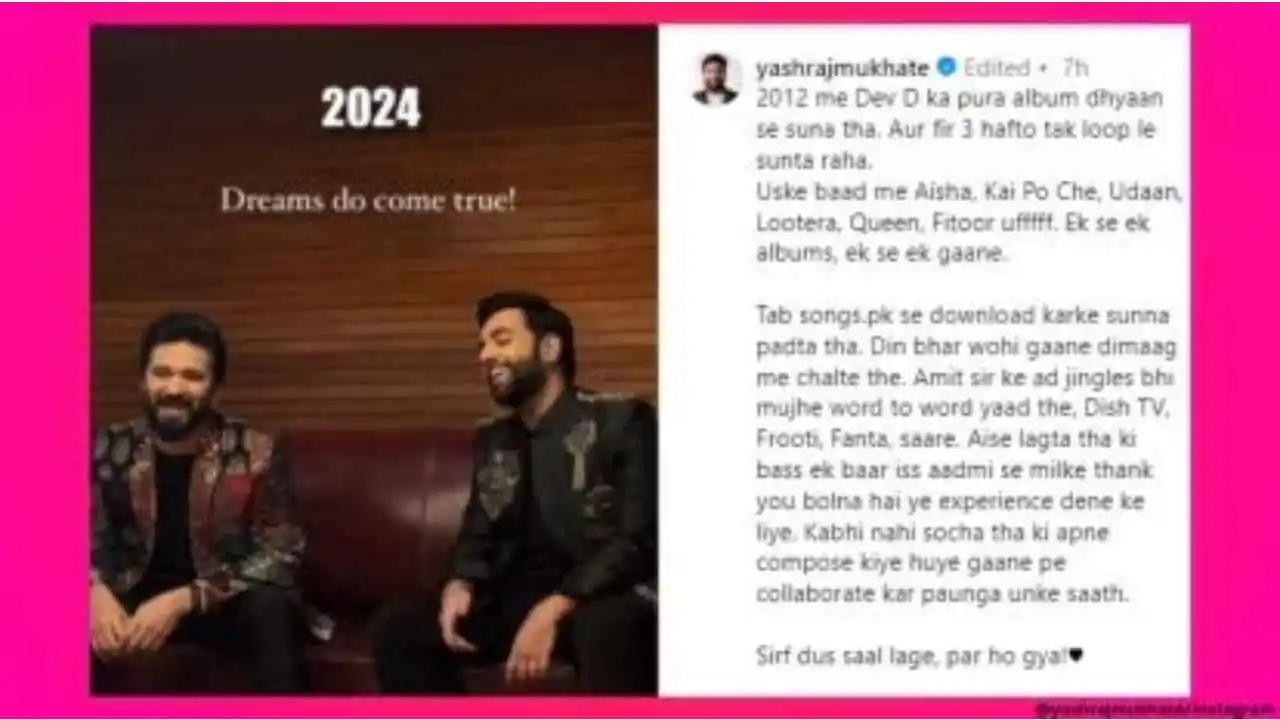
Amit Trivedi is known for his soulful compositions which weave profound lyrics, captivating music lovers. His songs spark a deep desire in aspiring artists to collaborate with him. Music producer and You Tuber Yashraj Mukhate had immense admiration for Trivedi’s artistry. In a post circulating on Instagram Yashraj Mukhate talks about his experience of listening to Amit Trivedi’s music and recalls how he had always dreamt of collaborating with Amit Trivedi.
He said his dream came true 2 years later in 2024 where he collaborated with Trivedi on the song Mann Dhaaga. He wrote that he had been listening to the entire Dev D Album carefully in 2012. And he kept listening to it on loop for 3 weeks. He continued to listen to Amit Trivedi compositions in Aisha, Kai Po Che, Udaan, Lootera, Queen, Fitoor continuously. He said he could not stop himself and became a big fan of the music director. He said he started dreaming of meeting his idol one day and collaborating with him.
He recalled that he had to download songs from songs.pk and listen to them. He said the songs kept running inside his mind all through the day. He added that he even remembered Amit Trivedi’s ad jingles word for Fanta, Frooti, Dish TV and all of them.
Mukhate said he always dreamed of meeting Amit Trivedi and wanted to thank him for giving this experience. The post has gone viral on social media with 96,445 likes till now. Large number of social media user commented on the social media post where one user Parth said the Yashraj Mukhate was truly an inspiration. One user said his dedication had brought him to level. One user said a man should make all his dreams come true by going through one hustle at a time.
Book reviews
The Sattvik Kitchen review: Relook at ancient food practices in modern times
If you are the one looking to embrace healthy food habits without compromising on modern delicacies, then this book is a must read!
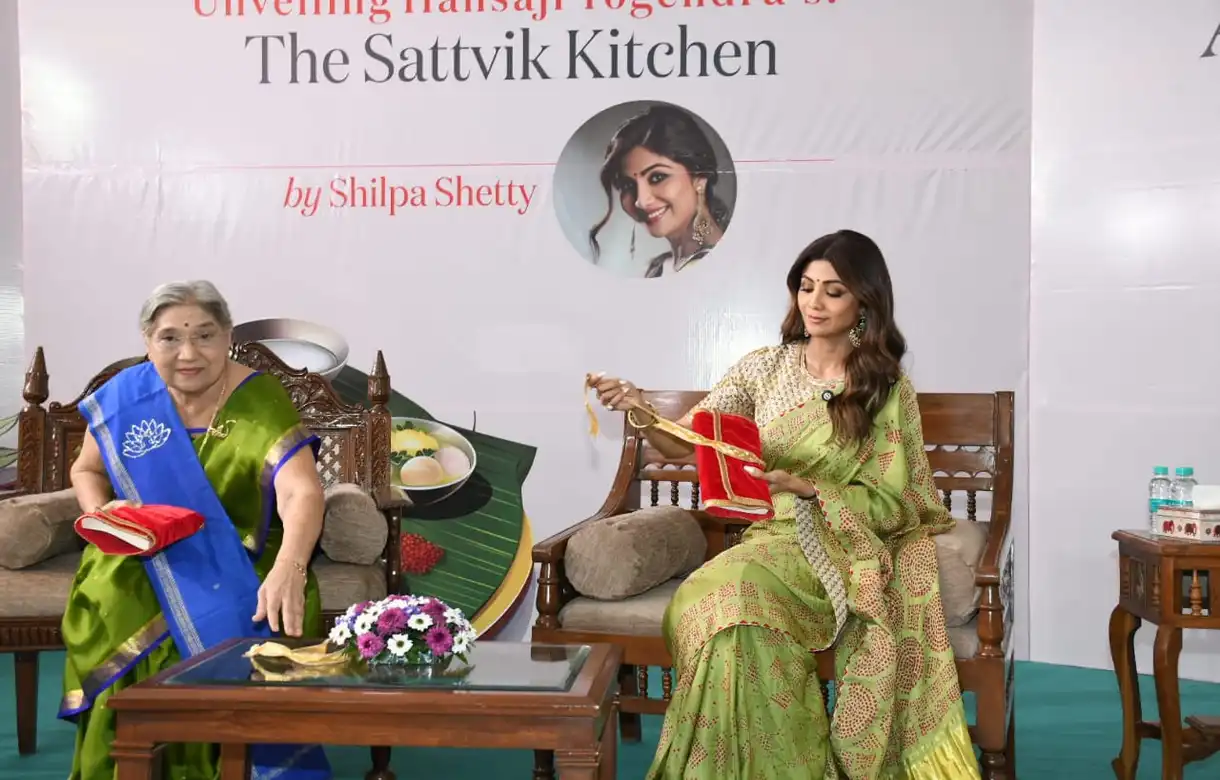
The cacophony of bizarre food combinations across the streets of India has almost taken over the concept of healthy food practices. Amid this, yoga guru Dr Hansaji Yogendra’s The Sattvik Kitchen, published by Rupa, is a forthright work that takes you back to ancient food practices and Ayurveda.
As the subtitle reads, The Art and Science of Healthy Living, the book endows a holistic approach to ayurvedic diet along with modern evidence based nutrition. From Basil-Broccoli Soup to Sprouted Green Gram Salad and Strawberry Oats Smoothie to Mixed Dal Parathas, the book not only provides you with the recipes but also stresses on healthy cooking tips together with nutritional benefits.
Besides, Dr Hansaji Yogendra’s book emphasizes on the traditional methods of food preparation and the advantages of using traditional cookwares like iron and copper vessels. The narrative portrays a balanced approach, knitting traditional wisdom with contemporary scientific understanding.
The author, through her book, sheds light on the principles of Ayurveda and highlights the metamorphic potential of adopting ancient food practices. She explains how our body reacts to food in terms of timing, quantity, manner of consumption and seasonal considerations. The book adeptly reintroduces ancient home remedies tailored to address various contemporary health issues.
Dr Yogendra, in her book, decodes the importance of nutritional knowledge to optimize both immediate and long-term health outcomes. It provides deep insights to understanding the intricate relationship between food choices and overall well-being, weaving Ayurveda with practical perception.
The book not only celebrates food philosophy but also offers a practical view into weight loss, well-being, and the profound impact of dietary choices on both physical and emotional aspects of our lives.
If you are the one looking to embrace healthy food habits without compromising on modern delicacies, then this book is a must read! The book is a roadmap to navigate the challenges of the modern day kitchens.
Book reviews
The Deccan Powerplay review: Bashing Chandrababu Naidu and his legacy
Amar Devulapalli’s book The Deccan Powerplay cornersthe TDP strongman with every petty incident exaggerated a la Baahubali
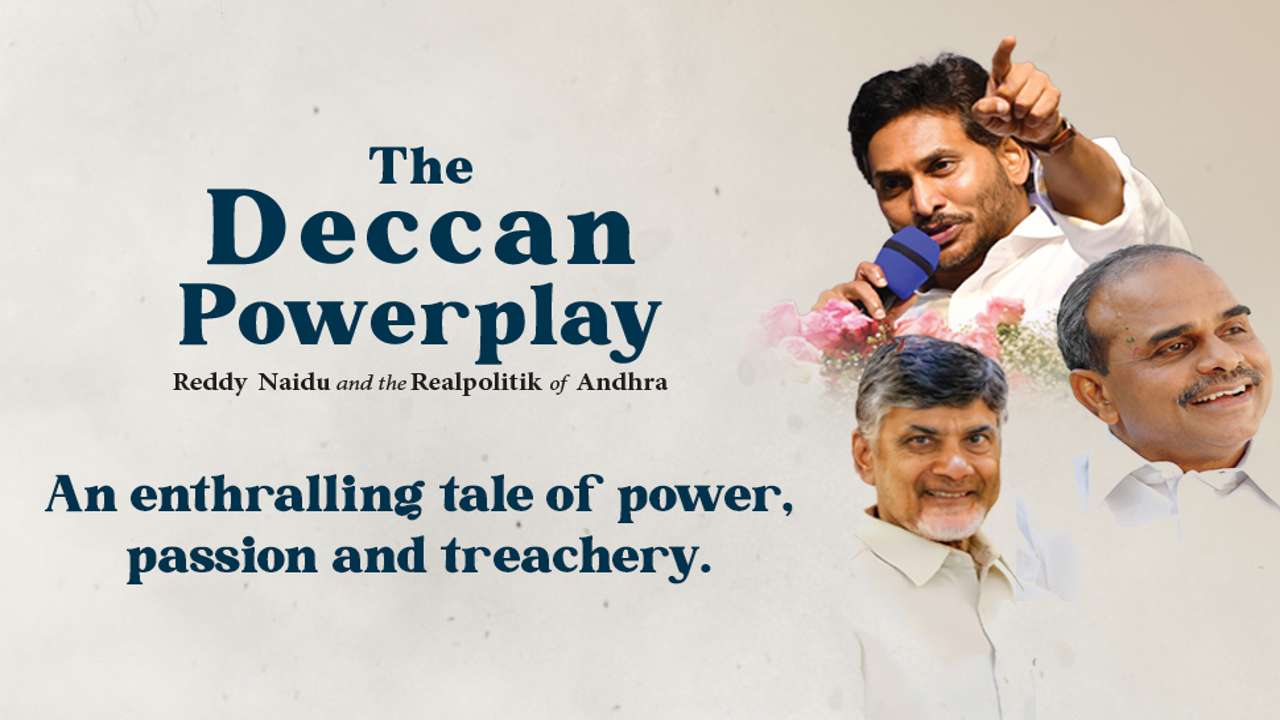
Mike Marqusee’s War Minus The Shooting is a seminal book on cricket and its influence on culture and politics in the Indian sub-continent during the 1996 Cricket World Cup. Amar Devulapalli’s book The Deccan Powerplay, published by Rupa, sounds like a similar exercise with its clear subtitle, “Reddy, Naidu and the Realpolitik of Andhra Pradesh“. The ambitious sounding subtitle crumbles under the weight of belied expectations of a scholarly treatise on the political interplay between the Reddys, the Kammas and the erstwhile united Andhra Pradesh. One can blame it on one’s own hopes and excuse the author of the lapse since the book has just three people to discuss: YS Rajsekhara Reddy, N. Chandrababu Naidu and Y.S. Jagan Mohan Reddy.
The chief protagonists here are YSR and his son, the incumbent Chief Minister of bifurcated Andhra Pradesh, Jagan Mohan Reddy. The lone villain, and one crafty as a fox if ever there was one, is Chandrababu Naidu. The book devotes a chapter to the corruption cases against Naidu, for which he was arrested in September 2023.
In crafting the narrative, the other heavyweights of Telugu country are discussed in passing, as peripheral players. N.T. Rama Rao does get the starring role, as befits the Telugu star of yesteryear and the founder of the Telugu Desam Party. But even this is fleeting. The Congress, which ruled the state till bifurcation, is portrayed as a faction-infested animal — so what if YSR stayed in the party both as loyal soldier as well as a seasoned yet dynamic general?
The book sets out to demolish the halo surrounding Naidu as the man who brought Information Technology majors to Hyderabad, nay Cyberabad, by beating Bengaluru. His breaking with NTR is depicted as a shrewd, calculated gambit to displace the TDP founder, who was also his father-in-law.
The book is replete with this and more Naidu nitpicking. Naidu took no bullshit from politicians or journalists. He gave it back to the scribes when needed, apart from his favourite media groups, one of the reasons they were not very happy kowtowing to him,
as the book suggests. Instead they would make ostentatious bows to any political alternative merely for being less brusque than the now-out-on-bail former CM.
The book picks apart every claim Naidu ever made and portrays him as an opportunist. The problem with this is possibly because Naidu preceded Jagan Mohan as the rump AP’s last CM and had presumably used every trick in his arsenal to discredit the younger contender.
With Assembly elections due this year, this book reads like a party pamphlet and comes across as a political weapon among the undiscerning. An Instagram handle could have been more useful to this end. But for such a grandly-titled book: the anticlimax is swift and painful.
-
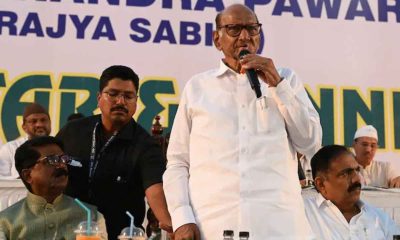
 2024 Lok Sabha Elections10 hours ago
2024 Lok Sabha Elections10 hours agoNCP (SP) leader Sharad Pawar says Prime Minister Narendra Modi is trying to create fear like Russian President Vladimir Putin
-

 Cricket news11 hours ago
Cricket news11 hours agoIPL 2024: Yashasvi Jaiswal hits brilliant century to help Rajasthan Royals beat Mumbai Indians by 9 wickets
-

 Entertainment9 hours ago
Entertainment9 hours agoMithun Chakraborty, Usha Uthup honoured with Padma Bhushan
-

 India News11 hours ago
India News11 hours agoArvind Kejriwal given insulin in Tihar jail after sugar levels touch 320
-

 India News10 hours ago
India News10 hours agoSalman Khan house firing case: Mumbai crime branch recovers gun, cartridges from Tapi River in Surat
-
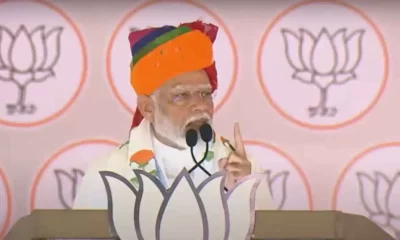
 2024 Lok Sabha Elections9 hours ago
2024 Lok Sabha Elections9 hours agoPrime Minister Narendra Modi says listening to Hanuman Chalisa under Congress rule is a crime
-

 Entertainment7 hours ago
Entertainment7 hours agoFan jumps on stage and hugs Atif Aslam during concert, video goes viral
-
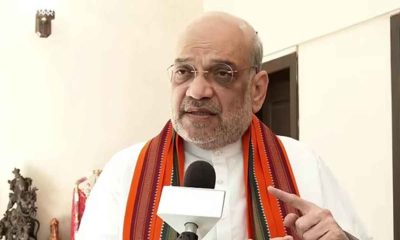
 2024 Lok Sabha Elections6 hours ago
2024 Lok Sabha Elections6 hours agoAmit Shah says neither Congress nor Trinamool chief Mamata Banerjee can interfere with CAA



